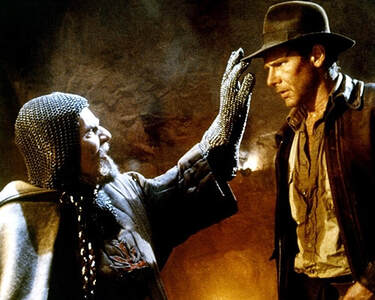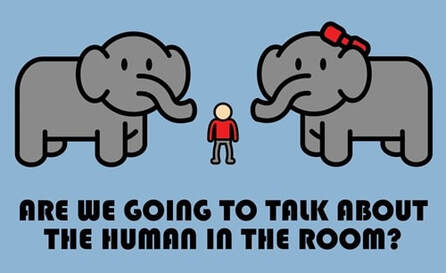|
It’s a simple tool I may use with people who feel stuck or who are struggling to gain traction with an issue. Imagine a person is facing a dilemma: they want to have more disposable income at the end of each month, but can’t work out how to achieve it. They face 3 principal options: to increase their income; to reduce their expenditure; or both. Or a person wants to lose weight and they, too, have 3 principal options, to: increase their physical exercise; to reduce their calorific intake; or both. A basic 4x4 grid can come in useful here. I may take a piece of paper or, if working online, open a whiteboard on screen that the other person can also see and write onto. On one axis, I will draw a polarity: ‘Willing to do’…’Not willing to do.’ On the intersecting axis: ‘Can do’…’Can’t do.’ It creates 4 possibilities: Willing to do and can do; Willing to do but can’t do; Can do but not willing to do; Can’t do and not willing to do. It also forms a visual graphic that segments different dimensions of experience. Now, in relation to each of the options (for instance: vis a vis income and expenditure; or exercise and dieting - above), I will ask the person to jot down their own responses in each quadrant. I will then invite them to reflect critically on what they have posted there: for example, What do they notice? How honest are they being with themselves? What presuppositions might they be holding? Who or what could be influencing what they have written in each area? Who or what could make a shift? More often than not, a person discovers they are indeed making assumptions that are limiting their horizons and actions; or that they are unwilling, for whatever reason, to do whatever it would take to achieve their goals. The first area can touch on blind spots (things they don’t see); the second on hot spots (things they don’t find easy to talk about). It may take considerable courage to admit to oneself that, for instance, ‘I’m not willing to put my money where my mouth is, or to take a risk.’ Spiritual-existential and psychological coaching can often prove helpful here, in that they enable a person to explore their underlying beliefs, values and motivations and what they or others may be doing subconsciously to sabotage themselves and their success. It creates a safe, supportive and challenging space and relationship in which to stand back, reflect, evaluate and re-engage from a more authentic stance. What do you desire most in life or work? Are you willing and able, or not? (See also: Grit and Get a grip)
26 Comments
‘For every complex problem there is an answer that is clear, simple and wrong.’ (H.L. Mencken) In a world that’s so often characterised by continual change, it appears that one thing that doesn’t change is our continual thirst for new acronyms. VUCA, RUPT or BANI – which best describes your view of reality? Which most helps you, or your clients, move forward to fulfil vision, values and goals, whilst navigating whom or whatever could fly in unexpectedly from left field on route? BANI, a more recent model than its predecessors, has some attractive and useful features for the current context. It acknowledges profound phenomenological dimensions of human experience, not simply the dynamics of the environmental realities we face. BANI draws attention to Brittleness, Anxiety, Non-linearity and Incomprehensibility and may provide a platform for addressing them. Brittleness recognises that those things we regard as secure can fall apart overnight. Anxiety points to associated social health risks of anxiety and depression. Non-linear means it’s hard to predict consequences of actions with certainty because influencing factors can spring up from anywhere. Incomprehensible proposes that sense-making is impossible and we can find ourselves bewildered. If that all sounds a bit abstract, think back to what you (and others) have witnessed and experienced in the past 2 years; how much of what has happened could have been known definitively in advance; what the impacts and implications have been for different people, groups and nations; how it has looked and felt; the deep questions it has raised; how clear and agreed a way forward is from here. Macro examples have included the ongoing climate emergency, the Covid19 pandemic, the plastic-in-the-oceans disaster and the migrant crisis. We’ve seen shifts in the world’s political and economic landscapes that have been, at times, so sudden and so dramatic that they’ve caused whiplash and backlash. We have felt the ripple effects in our organisations, communities and personal lives. What wisdom can BANI offer? Here are glimpses: Brittleness calls for resilience and collaboration; Anxiety: for empathy and human-spiritual relationship; Non-linearity: for adaptivity and agility; Incomprehensibility: for intuition and risk-taking. These are pointers to the kinds of qualities and capabilities we can develop for the future, with courage and humility as an underpinning stance. Do you feel dazed and confused in a BANI world? Curious to discover how I can help? Get in touch! If at first you don't succeed? 'Try to hide your astonishment.' (Harry Banks); 'Hide all the evidence that you ever tried!' (Billy Collins) There are things we can do, and there are things we are willing to do; and there is a great deal of difference between the two. I could be, for instance, capable of doing a particular job well but have absolutely no commitment to do so. I could, conversely, throw myself wholeheartedly into a job that I’m hopelessly incompetent at. If we like grids, we can draw two axes with can do/can’t do as one polarity, and willing to do/not-willing to do as the other. It makes a great, simple tool to use in e.g. recruitment and selection; performance management and development; talent and career planning. I worked with an organisation that used ‘ready, willing and able’ as a core talent management tool; a variation of a standard performance vs potential matrix. Ready meant ‘can do’ (as above) and able meant ‘wider life and work circumstances-permitting’. It opened up some valuable and creative conversations when leaders and team members met to compare and contrast insights, aspirations and ideas on possible ways forward. The ‘able’ dimension also drew broader cultural, contextual and systemic factors into the frame: influences that lay beyond individual can-do and will-do alone. In my experience, the ‘will-do’ dimension, which incorporates e.g. motivation, determination and perseverance, often proves vital. It taps into beliefs, values and character and sifts out, ‘I would love to do this, in principle’, from, ‘I am willing to do whatever it takes (within legal-ethical boundaries) to succeed.’ It’s also the aspect that many leadership, recruitment, coaching and training conversations pay least attention to; assuming that e.g. goals, experience, qualifications, knowledge and skills are enough. How do you ensure traction? How do you test, nurture and help sustain the critical ‘will’? What principles, beliefs or values guide your most important decisions? Olson (below) sounds a word of caution and Nickols offers a useful grid. Let me know what you think! ‘There are no solutions; there are only trade-offs.’ (Thomas Sowell) It was a critical juncture in my life so I met with a friend and mentor, Adrian Spurrell, to think things through. I had lots of ideas and some concerns but struggled to clear the mental fog that was amassing in my head. What to choose, what to do, when there are so many issues and options in the frame yet no clear and definitive way forward? Adrian challenged me by drilling down hard to my values, to what (for me) is non-negotiable and what isn’t, to sift the proverbial wheat from the chaff. The serious conclusions I reached in that conversation 2 years ago have guided my major life decisions since. This approach resonates with Dr Deborah Olson’s view in Psychology of Achievement (2017) who comments that: ‘When clarifying your goals, be clear about what you want – and consider the things you don’t want to risk.’ Don’t want to risk adds a useful and important dimension to more conventional goal-orientated conversations that focus solely on what we hope to obtain or achieve. I worked with one organisation where the founder lived an aspirational life and achieved amazing things at work but lost sight of his family. His daughter committed suicide. The ethical stakes can be very high indeed. Fred Nickols offers a simple and practical tool called a ‘Goals Grid’ that can be used to help identify goals and priorities (https://www.nickols.us/versatiletool.pdf) at personal, team and organisational levels. It poses two key questions: ‘Do I/we have it?’ and ‘Do I/we want it?’, places these questions on the axes of a 2-by-2 grid, adds the alternative responses of ‘Yes’ or ‘No’ against each question and proposes an action for each domain. The resultant combinations and options are: Have + Want = Preserve; Have + Don’t want = Eliminate; Haven’t + Want = Achieve; Haven’t + Don’t Want = Avoid. Nickols’ model can be applied flexibly and creatively to incorporate a diverse range of helpful angles in leadership, OD, coaching and training conversations; e.g. strategic-visionary, spiritual-existential, psychological-relational and tactical-systemic. It ensures that trade-offs are made as conscious decisions with transparency and awareness. It also reminds that, when reaching towards a brighter future, to notice, value and protect who and what matters most. ‘Not jeopardising what we already have can matter as much as gaining new things.’ (Olson, 2017). Always keep values in sharp view. 'Worthwhile elephants make it real.' ‘Of course.’ I can hear you thinking. ‘Tell us something we don’t already know.’ Or, perhaps – and quite reasonably so – you are wondering what on earth I am talking about. If, by chance, I have spiked your curiosity, let me break it down into 3 parts that form important ingredients of inspiring and effective conversations at work: worthwhile; elephants; make it real. It’s about a degree of focus and quality of contact that can release energy, engender engagement and achieve great results. First: worthwhile. ‘If we were to be having a really useful conversation, what would we be talking about?’ (Claire Pedrick). ‘What outcome from this conversation will mean our time together will have been well spent?’ Or, ‘First things first – begin with the end in mind.’ (Stephen Covey). The aim here is to clarify goals and aspirations, test implicit assumptions and co-create focus. It addresses the question: ‘Of all the things we could spend time doing together, what would make this valuable?’ Second: elephants. ‘The most valuable thing any of us can do is find a way to say the things that can’t be said.’ (Susan Scott). It’s about naming the proverbial elephants in the room or, in Gestalt, speaking the unspoken, saying the un-said. ‘What are we not talking about that, if we were to talk about it, would release fresh insight and energy in this conversation…and in this relationship too?’ This is an invitation to ‘radical candour’ (Kim Scott), to practise courage, disclosure and openness. Third: make it real. ‘What matters most to you in this?’ It’s about being real…doing real…avoiding an unhelpful, distracting dance around the most important questions and issues in the room. Cultural complexities surface here: how to hold conversations that are open and honest and, at the same time, respectful of different cultural nuances and norms. The core principle here is ‘challenge with support’ (Ian Day & John Blakey): having the conversations we need to have to move things forward. We never really work with ‘just an individual’ because human beings always exist within systems of relationship. (Malcolm Parlett)
You’re not alone. Neither are your colleagues or clients. OK, you may be alone in a room together (if I can use ‘alone’ and ‘together’ in the same breath like this) for a meeting, a training workshop, a catch-up, a coaching conversation. As you focus intently on the other person or group – their goals, interests, ideas, concerns etc. – it can be as if the wider world and its noisy distractions fade out of existence, at least for a moment. There is just you…and me…and us. Our space. It is a kind of sacred space and it can feel – spiritual. It has a person-centred quality about it. We may conceive of what we bring as the gift of our presence, attention and expertise. It can be immensely affirming for the other and it ensures they feel seen, heard, valued and understood. It can feel like offering…love. But far be it from us to use the L word in a corporate context! So we will sanitise it for now with culturally-safer words like empathy and respect. Still with me? Now a sting in the tail. There are some important risks here. In our heartfelt desire to be client-focused, how often do we hear trainers and coaches say things like, ‘My job is to help you reach your goals’ or, in marketing-speak, ‘Your success is my success’? I get the principle but it can lead us to approach our work in a blinkered way, as if the person exists in a relational, cultural and contextual bubble. Where are the ethics in this if our sole focus is on the client or group? Take the person whose success will undermine the success of peers in other teams or the wider strategy of the organisation. Or the person whose success will impact negatively on people and groups in the wider community, e.g. politically, economically or environmentally. Our well-meaning interventions can inadvertently collude with or even facilitate hidden or unintended consequences. So: what can we do to address this? What are we willing to take responsibility for? |
Nick WrightI'm a psychological coach, trainer and OD consultant. Curious to discover how can I help you? Get in touch! Like what you read? Simply enter your email address below to receive regular blog updates!
|








 RSS Feed
RSS Feed